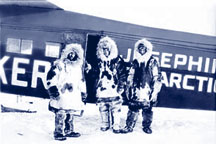This is a relative part of the transcript of a PBS interview (for their 1999 film, "Alone On the Ice") with Bess Balchen Urbahn about Bernt Balchen and the arctic flight of the Josephine Ford:
PBS: What happened when Bennett and Balchen were flying together on the Josephine Ford?

BBU: Bernt, as always, and he did this as long as I can remember, he always kept a very careful log and he did it this time, and he realized that the plane wasn't as fast as it was supposed to be and he knew that something was wrong, that it couldn't have reached the Pole, and he figured and he figured and finally asked Bennett about it. The only two people who definitely knew about the plane's performance were Floyd Bennett and Bernt Balchen; nobody else did. They can discuss it until doomsday, the facts are there, definitely. You cannot discuss it. The plane did not make the Pole ... period.
PBS: Why did Balchen feel the plane had not made the Pole? Can you make that clear? It didn't go fast enough? They weren't away long enough?

BBU: They went away, when the Josephine Ford left Spitsbergen, of course the time, I don't remember what time it left but it was gone for 15 and a half hours, and given the drag of the skis [ed note: which Balchen had repaired for Byrd] and the speed that the plane made, it just wasn't enough time to reach the Pole from Spitsbergen.
PBS: In his accounts of the North Pole flight, what credit did Byrd give Balchen for his role and how did Balchen feel about it?

BBU: To the best of my knowledge, Byrd never gave Bernt Balchen any credit for what he had done, at least officially. What he did was to ask him to come with him to America, which Bernt, my husband, thought was praise enough because he was young, and he was adventuresome, and he thought this was a great opportunity.


